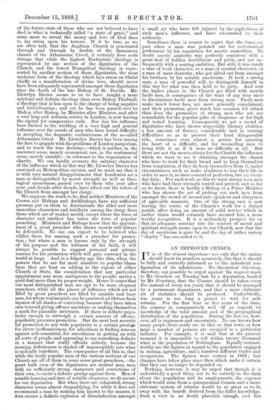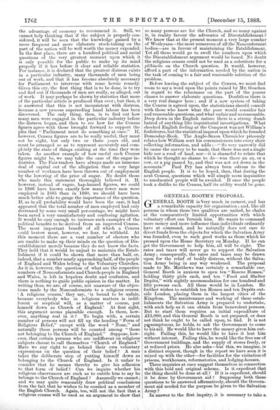AN IMPROVED CENSUS.
IT is of the utmost importance not only that the nation should know its numbers accurately, but that it should be fully and correctly informed as to the industrial con- figuration of its inhabitants. No theoretical objection, therefore, can possibly be urged against the request made to Mr. Goschen on Tuesday last by a deputation, headed by Mr. Courtney, that the Census should be taken every five instead of every ten years, that it should be managed by a permanent department, and that a more elaborate set of statistics should be produced. Undoubtedly, ten years is too long a period to wait for new returns. For the first four or five years of the time, the country is comparatively well off as regards its knowledge of the total amount and of the geographical distribution of the population. During the last six, how- ever, all is vagueness and uncertainty. No one knows how many people there really are in this or that town, or how large a number of persons are occupied in a particular industry. For example, it is said that at the present moment it is impossible to tell within twenty thousand what is the population of Nottingham. Equally untrust- worthy are the figures in regard to the population engaged in mining, agriculture, and a hundred different trades and occupations. The figures were correct in 1881; but changes have taken place since then which make it certain that they can no longer be depended on. Perhaps, however, it may be urged that though it is undoubtedly a good thing not to be entirely in the dark about the population and its employments, the expense which would arise from a quinquennial Census and a more elaborate system of returns would be so great as to do away with the benefit derived from the fuller knowledge. Such a view is no doubt plausible enough, and has the advantage of economy to recommend it. Still, we cannot help thinking that if the subject is properly con- sidered, it will be seen that the knowledge gained by a more frequent and more elaborate stock-taking on the part of the nation will be well worth the money expended. In the first place, there are a hundred political and social questions of the very greatest moment upon which it is only possible for the public to make up its mind properly if it has before it clear and reliable statistics. For instance, it is declared that the greatest distress exists in a particular industry, many thousands of men being out of work, and that it has become absolutely necessary for Parliament to intervene with some heroic remedy. Given this cry, the first thing that is to be done, is to try and find out if thousands of men are really, as alleged, out of work. It may perhaps be shown by statistics that more of the particular article is produced than ever ; but then, it is answered that this is not inconsistent with distress, because a new process superseding hand labour has been discovered. The only thing, then, is to find out how many men were engaged in the particular industry before the distress began, and then to see how far the Census figures agree with those brought forward to support the plea that " Parliament must do something at once." If, however, Census figures are to be really useful, they must not be eight, but only two or three years old, and must be arranged so as to represent accurately and com- pletely the state of things existing at the time they were taken. As another example of how useful such Census figures might be, we may take the case of the sugar in- dustries. The Fair-traders have always made an immense deal of capital out of the allegation that a very large number of workmen have been thrown out of employment by the lowering of the price of sugar. No doubt those who made this statement thoroughly believed it. If, however, instead of vague, hap-hazard figures, we could in 1886 have known exactly how many fewer men were employed in 1885 than in 1880, we should have been much better able to gauge the importance of the question. If, as in all probability would have been the case, it had appeared that the total number of men employed had only decreased by some very small per-centage, we might have been saved a very unsatisfactory and confusing agitation. It would be easy enough to increase such examples of the political benefits to be derived from an improved Census. The most important benefit of all which a Census could bestow must, however, we fear, be withheld. At this moment there are a vast number of electors who are unable to make up their minds on the question of Dis- establishment merely because they do not know the facts. They hold that it would be unjust to maintain the Estab- lishment if it could be shown that more than half, or, indeed, that a number nearly approaching half, of the people of England and Wales belong to the Voluntary Churches. As it is, however, the question of what are the respective numbers of Nonconformists and Church-people in England and Wales, is left in hopeless doubt and confusion, and there is nothing to guide public opinion in the matter. In writing thus, we are, of course, not unaware of the objec- tions made by the Nonconformists to a religious census. A religious census,' they say, is bound to be unfair, because everybody who in religious matters is indif- ferent or sceptical will, as a matter of course, put himself down as Church of England.' At first sight, this argument seems plausible enough. Is there, how- ever, anything real in it ? To begin with, a certain number of persons will not fill up the heading " Form of Religious Belief," except with the word " None," and naturally these persons will be counted among " those not belonging to the Church of England." Suppose, how- ever, that certain persons who are indifferent on religious subjects choose to call themselves " Church of England." Have we any right to go behind their own voluntary expressions on the question of their belief ? A man takes the deliberate step of putting himself down as belonging to the Church of England. Is it unfair to consider that he means thereby to give his adhesion to that form of belief ? Can we inquire whether his religious observances are such as to entitle him. to say he belongs to the Church of England ? Assuredly we cannot ; and we may quite reasonably draw political condusions from the fact that he wishes to be counted as a member of the English Church. Again, too, will not the fact that a religious census will be used as an argument to show that so many persons are for the Church, and so many against it, in reality favour the advocates of Disestablishment ? We know that at the present moment a-very large number of Wesleyans—the most numerous of all the Nonconformist bodies—are in favour of maintaining the Establishment. Yet all these would go to swell the numbers upon which the Disestablishment argument would be based. No doubt the religious census could not be used as a substitute for a plebiscite on the Church question. It would, however, afford a part of the information needed by the nation in the task of coming to a fair and reasonable solution of the problem.
Before leaving the subject of the Census, we must find room to say a word upon the points raised by Mr. Groschen in regard to the reluctance on the part of the poorer classes to answer elaborate questions. Doubtless there is a very real danger here ; and if a new system of taking the Census is agreed upon, the statisticians should consult with those who know what the poor would consider fair and reasonable questions, and what unfair and unreasonable. Deep down in the English nature there is a strong dumb hatred of anything like inquisitorial investigations. What shocked English feeling at the Conquest was not William's forfeitures, but the statistical inquest upon which he founded Domesday-Book. The Anglo-Saxon Chronicler piteously relates how William sent his commissioners into every shire collecting information, and adds :—" So very narrowly did he cause the survey to be made, that there was not a single hide nor a rood of land, nor—it is shameful to relate that which he thought no shame to do—was there an ox, or a cow, or a pig passed by, and that was not set down in the accounts." Paul Pry has always been odious to the English people. It is to be hoped, then, that during the next Census, questions which will simply seem inquisitive to uneducated people will be avoided. If once the people took a dislike to the Census, half its utility would be gone.















































 Previous page
Previous page